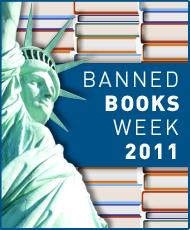
September 24 – October 1 is Banned Books Week, and new this year is Banned Sites Day on September 28. All week ACLU staff and volunteers are posting their thoughts about the freedom to read — both books and online content. Celebrate your First Amendment rights by attending one of the ACLU’s Banned Books events or just by reading whatever you choose.
No matter how well intended, banning books is censorship and infringes on the rights of a free society. So when books are banned from libraries, a practice that unfortunately continues today, librarians and civil libertarians speak up.
Tonight the Pittsburgh Chapter of ACLU of Pennsylvania will showcase freedom of expression and decry censorship at our 16th annual fREADom celebration during Banned Books Week. We’re teaming up with Carnegie Library of Pittsburgh and WYEP 91.3FM for an event where a range of Pittsburgh’s arts-loving activists — including a rapper, a teacher, a songwriter, and a poet — will read from books that have been banned or challenged.
No one’s going to tell us what we can’t read.
Pittsburgh is a uniquely appropriate home for the celebration of Banned Books Week. In 1982, Pittsburgh native Judith Fingeret Krug founded Banned Books Week as an annual national happening to celebrate the First Amendment and educate citizens on the folly of censorship. Krug was a lifelong champion of free speech as director of the American Library Association’s Office for Intellectual Freedom, and as head of the ALA’s Freedom to Read Foundation. When she died in 2009, the ALA hailed Judith Fingeret Krug as “principled and unwavering” in her defense of “the rights of individuals to express ideas and read the ideas of others without governmental interference.” The ACLU could not have had a stronger ally.
Krug’s life and accomplishments distinguished her as one of our country’s great civil liberties leaders. Our fREADom event (dedicated to Krug’s legacy and partially supported through a foundation grant established by her family) salutes her tireless efforts to ensure the public’s right to know.
Unapologetic and principled, Krug fought for inclusion of literature on library shelves that she herself found offensive. “My personal proclivities have nothing to do with how I react as a librarian, . . . library service in this country should be based on the concept of intellectual freedom, of providing all pertinent information so a reader can make decisions for himself.” The success of our Banned Books program demonstrates that, like Krug, savvy Pittsburghers appreciate not only the intrinsic value of literature they love but also the vital necessity of protecting literature they may disfavor.
This year we are also expanding the concept with a second event we’re calling Banned After Dark, set to take place Wednesday, October 26, 8-11 p.m. at Brillobox in Pittsburgh. Our goal is to attract a new audience by gathering an avant-garde group of performers to present a slightly more risqué mix of banned material in a bar setting with music and video projections. Banned After Dark provides a more adult alternative in a hip setting while still underscoring the message of artistic free expression — it’s education with a chaser.
Tonight’s event, fREADom, showcases local luminaries reading and performing excerpts from their favorite banned books, plays and poetry — it’s eclectic, enlightening, entertaining, and sometimes even challenging.
After all, the First Amendment is anything but boring.
Learn more about censorship: Sign up for breaking news alerts, follow us on Twitter, and like us on Facebook.




